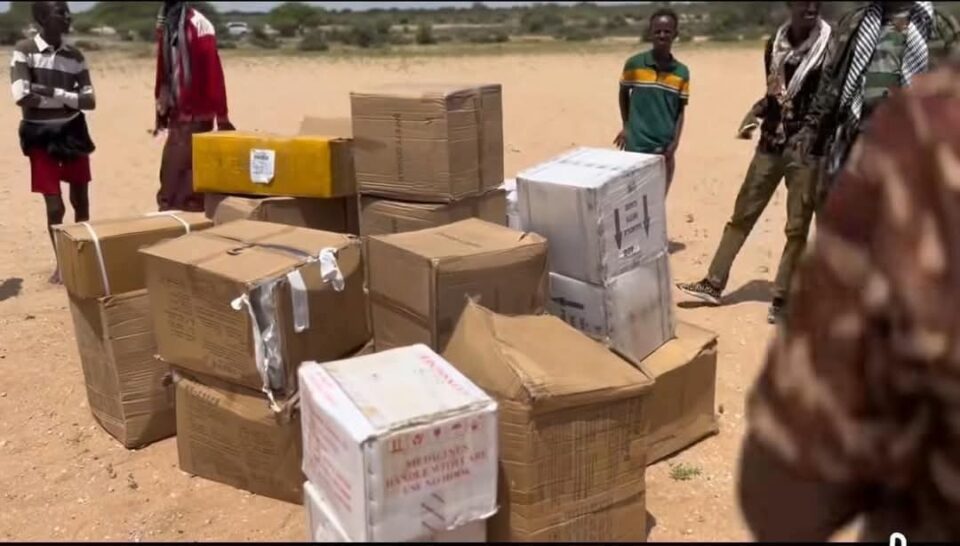MOGADISHU, Somalia — In the heat of battle against al-Shabab militants in Somalia’s Hiiraan region, local militia known as Macawisley had hoped for critical emergency medical supplies from the federal government. What arrived instead were five boxes—delivered by two chartered aircraft—containing expired COVID-19 vaccines, multivitamins, children’s syrup, and a handful of basic antibiotics.
The aid, delivered under the banner of emergency support, sparked immediate outrage.
“To our disappointment, the government didn’t even ask what we needed to treat our wounded,” said a Macawisley spokesman, displaying the contents to reporters on Friday.
Notably missing: emergency trauma kits, antiseptics, or anything remotely useful in combat medicine.
“Instead, they sent us irrelevant and expired COVID-19 doses in five boxes. It’s sad.”
The delivery, reportedly costing nearly $15,000 in transportation alone, has drawn widespread criticism and renewed concerns about the Somali federal government’s logistical planning and political priorities.
The federal government, meanwhile, held a press event upon the planes’ arrival on Saturday, complete with photos and statements touting its responsiveness.
Yet little attention was paid to the contents of the delivery—nor to the visible disappointment of those meant to receive it.
In Moqokori, a frontline town onf Hiiraan, the mood was somber and tense as residents and fighters questioned the intent behind what many described as a symbolic—rather than substantive—gesture.
“This is demeaning,” said a local resident who witnessed the aid offloading and confronted the head of the Somali Disaster Management Agency (SODMA).
“It’s like they came here to insult us, not support us.”
Hiiraan has been the center of an intense grassroots campaign against al-Shabab, led by Macawisley militias formed by local communities.
In recent years, they have reclaimed territory and pushed back insurgent forces with minimal federal support.
Their success has been praised by many Somalis—but not always matched with material backing from Mogadishu.
The Somali government has not issued a formal statement about the content of the aid, nor has SODMA responded to questions about how expired medications were included in a high-profile emergency shipment.
Policy analysts say the incident illustrates a deeper problem in Somalia’s fragile governance architecture.
“This is not just a logistical failure—it’s a political signal,” said a Mogadishu-based researcher affiliated with a regional think tank.
“It reinforces the perception that the federal government is detached from the realities on the ground, particularly in regions that have taken independent initiative in the fight against al-Shabab.”
The controversy arrives at a precarious time for President Hassan Sheikh Mohamud’s administration, which is grappling with growing public dissatisfaction, security volatility, and rising political competition ahead of scheduled elections next year.
Analysts warn that failures in frontline support could fuel broader unrest, including renewed calls for decentralized or regional autonomy.
“This episode risks becoming more than a scandal—it could be a turning point,” the analyst added.
For the fighters in Hiiraan, the message from Mogadishu was not one of partnership—but of profound neglect.
“We haven’t asked for luxuries,” the militia’s spokesman said. “We just want what any government should give its people during war: respect, and real support.”
“This is not just about five boxes,” said a senior Somali opposition figure in Mogadishu.

“It’s about how the state chooses to engage with communities on the front lines. When the message is ‘You’re on your own,’ trust breaks down.”
With Somalia approaching a politically volatile election year, the implications go beyond humanitarian coordination.
The perceived indifference to frontline suffering could widen political rifts, especially as opposition leaders mobilize around issues of federal neglect.
For the fighters in Hiiraan, the aid airlift sent a different kind of message: not solidarity, but silence.
‘DYSFUNCTION INDICATORS’
For the experts and observers, the incident underscores what they describe as the ‘normalization of dysfunction’ at the heart of the Somali state
“This is not a lapse in logistics—it’s a window into Somalia’s entrenched culture of corruption,” said Dr. Mahad Nur, an expert on public sector integrity.
“The delivery of expired medication to a war zone, after spending tens of thousands of dollars on air transport, isn’t just negligent—it’s deliberate misuse of state resources.”
Dr. Nur said such incidents are increasingly common in Somalia, where aid, procurement, and emergency response have become lucrative vehicles for elite enrichment.
“These gestures are not meant to serve the public. They’re designed to check donor boxes, generate photo ops, and siphon funds along the way.”
“Accountability in Somalia isn’t weak—it’s practically nonexistent,” he added. “Officials can embezzle public and foreign funds with near-total impunity, shielded by political alliances and a lack of prosecutorial will. The Macawisley episode is just the latest visible symptom of that deeper disease.”
According to Nur, the fact that expired vaccines and irrelevant items were classified as “emergency aid” suggests systemic manipulation at multiple levels—procurement, approval, and oversight. “Everyone involved knew what was in those boxes. No one cared. Because the goal was never to heal wounds—it was to extract profit.”
SOMALIS REACT WITH BLISTERING FURY
For many Somalis, it is a vivid illustration of a deeper national crisis—where mismanagement, corruption, and lack of accountability routinely undermine the nation.
On social media, voices from across the Somali public spectrum did not hold back to express their outrage.
“Two planes, five boxes, expired meds—this is how they treat people fighting terrorists? Somalia is being run like a joke.”
— Yasmin Warsame
“Imagine risking your life against al-Shabab and the government sends you expired vitamins as a reward. Demeaning isn’t even the word.”
— Abdirizak Ahmed
“This isn’t aid. It’s theft in broad daylight with a photo op. Where did the $30,000 really go?”
— Khadar Ali
“Expired COVID shots for wounded fighters? Somalia’s leaders didn’t even pretend to care this time.”
— Ayaan Abdullahi
“The Macawisley are the only ones fighting al-Shabab with results—and this is how they’re repaid? Shameful.”
— Mustaf Hassan
“SODMA should be renamed SODMAA: Somalia’s Official Disaster Mismanagement Agency and Accessories.”
— Deqa Mohamed
“Somalis aren’t mad because the boxes were small. We’re mad because this is how corruption speaks: loudly, with fake medicine and silence on accountability.”
— Liban Isse
“This is state betrayal, not a logistical error. How do you send expired meds to wounded soldiers and expect to be taken seriously?”
— Fatuma Mahad (
“Five boxes. Two aircraft. Zero dignity.”
— Abdirahman Gurey
“This is exactly why people lose faith in government. This isn’t just failure—it’s calculated neglect.”
— Hodan Shire





